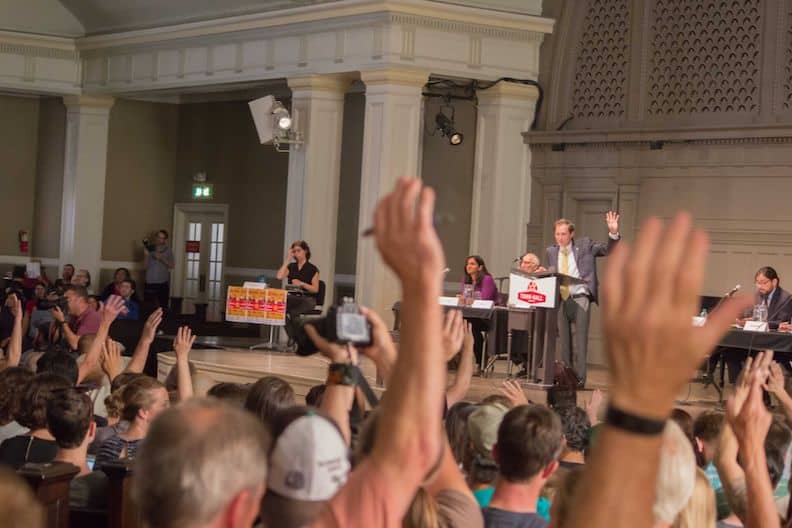The Role of Laity in Catholic Social Teaching (Part 2 of 4)
by CAPP-USA

The Role of Laity in CST includes Politics
What Exactly Must I Do?
“Freedom…demands the courage to engage in civic life and to bring one’s deepest beliefs and values to reasoned public debate”. (Pope Benedict XVI)
We continue examining the role of laity. Since Vatican II our Church has called on the laity to be God’s voice in the world. (Lumen Gentium, IV) It is our special task to order and throw light upon all the affairs of the world in line with the teachings of Jesus Christ. That is our unique and special mission. And what an onerous task it is – if taken seriously: We are directly charged to help fulfill Christ’s prophetic office.
Nor is this some ephemeral charge! “The laity have the principal role in the overall fulfillment of this duty.” (Lumen Gentium, 36) Both individually and corporately we are called on to make a practical difference in the world: “let the laity also by their combined efforts remedy the customs and conditions of the world.” (Lumen Gentium, 36)
Indeed, “A new state of affairs today both in the Church and in social, economic, political and cultural life, calls with a particular urgency for the action of the lay faithful. If lack of commitment is always unacceptable, the present time renders it even more so. It is not permissible for anyone to remain idle.” (Pope St. John Paul II, 3)
The Role of the Laity Involves Politics
On a practical level, in democratic societies a key way every Catholic can accomplish this obligation is through voting. Indeed, participation in politics is a Christian obligation: “We, Christians, cannot ‘play Pilate’ and wash our hands…We must participate in politics because politics is one of the highest forms of charity because it seeks the common good. And Christian lay people must work in politics.” (Pope Francis) Indeed, “Politics is an essential means of building human community and institutions”. (Pope Francis, 2)
Pope Francis also recognizes that this “is not easy; politics has become too tainted. But I ask myself: Why has it become tainted? Because Christians have not participated in politics with an evangelical spirit? …To work for the common good is a Christian duty, and many times the way in which to work towards it is through politics.” (Address to the Students of the Jesuit Schools of Italy and Albania)
“[T]o take politics seriously at its different levels – local, regional, national and worldwide – is to affirm the duty of each individual to acknowledge the reality and value of the freedom offered him to work at one and the same time for the good of the city, the nation and all mankind”. (Pope St. Paul VI, 46)
Grounded in Human Dignity
“Political office and political responsibility thus constantly challenge those called to the service of their country to make every effort to protect those who live there and to create the conditions for a worthy and just future. If exercised with basic respect for the life, freedom and dignity of persons, political life can indeed become an outstanding form of charity.” (Pope Francis, 2)
What About Those in Business or Finance?
“I ask them not to yield to an economic model which is idolatrous, which needs to sacrifice human lives on the altar of money and profit. In economics, in business and in politics, what counts first and foremost, in every instance, is the human person and the environment in which he or she lives.” (Pope Francis, 3)
“So, for those charged with promoting economic development, they “have the responsibility of ensuring that it always has a human face. Economic development must have a human face…They have in their hands the possibility of providing employment for many persons and in this way of giving hope to many families. Putting bread on the table, putting a roof over the heads of one’s children, giving them health and an education – these are essential for human dignity, and business men and women, politicians, economists, must feel challenged in this regard.” (Pope Francis, 3)





